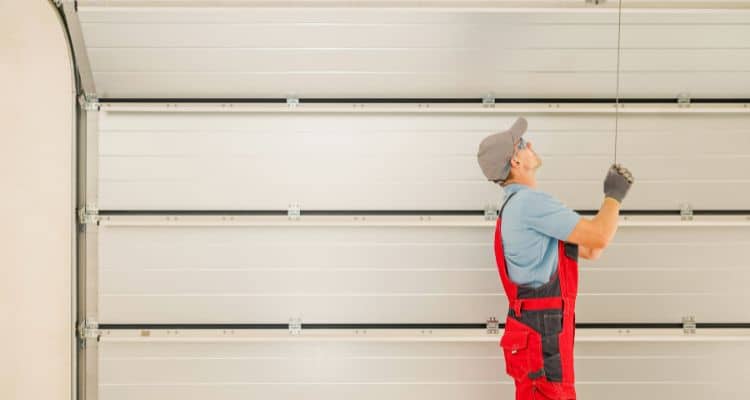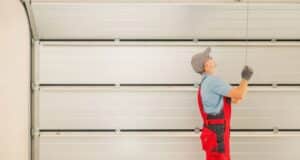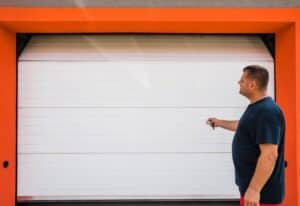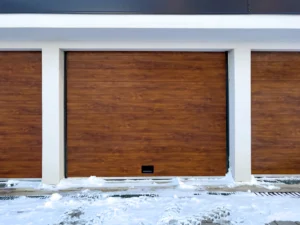What Causes a garage door noises?
First, let’s review the most common reasons for a noisy garage door.
- Loose or worn-out screws and bolts: Over time, the screws and bolts that hold the garage door together can become loose or worn out, leading to a clattering noise when the door opens or closes.
- Loose parts in the mechanism: The various pulleys, cables, springs, brackets, and other components that make up your garage door system can also become loose or worn out over time. If any of these parts are loose or broken, it could cause rattling noises as they move against each other during operation.
- Misaligned tracks: Your garage door runs on two metal tracks parallel to each other along either side of the opening. If these tracks are bent, warped, or misaligned, it can cause a clattering noise when the door opens and closes.
- Out of balance: If your garage door is out of balance, either due to weight distribution or worn-out parts, it can make loud noises as the opener attempts to open and close it.
- Improper installation: If your new garage door is not installed correctly, it can make loud noises due to an improper fit or misaligned parts.
How To Troubleshoot and Fix a Noisy Garage Door
Identify the source of the noise.
Before fixing a noisy garage door, it is important to identify the noise source. Here are some steps you can take to narrow down the cause:
Listen for the source of the noise:
Please pay attention to where the noise comes from and what it sounds like. Is it a loud bang, a grinding noise, or a squealing sound? Understanding the specific type of noise can help you determine the cause.
Check for debris or objects blocking the door’s movement:
Look for any debris or objects that may be caught in the door or prevent it from moving smoothly. This could include leaves, sticks, or even small rocks. Clear away any obstructions and see if the noise persists.
Examine the door’s balance and alignment:
An unbalanced or misaligned garage door can cause noise when it moves. Pull the emergency release cord to disengage the opener and manually lift the door about halfway to check the balance. It should stay in place and not require much effort to hold up. If it is difficult to lift or falls quickly, the door may be out of balance and need adjustment. To check the alignment, look at the door from the outside. It should be straight and not leaning to one side. If it is misaligned, it may need to be adjusted or repaired.
Once you identify the source of the noise, it is time to take steps to fix it. Depending on the problem, this could involve lubricating hinges or springs, adjusting or replacing rollers, tightening hardware, or adjusting the door’s balance.
Loud garage door repair
If your garage door is making a lot of noise, you may need to repair or replace parts to fix the problem. Start by inspecting the door and hardware for visible damage or wear.
Inspect the door and hardware for visible damage or wear:
Look closely at the door and its components for signs of wear or damage. This could include dents, scratches, worn springs, loose bolts, or other signs of damage. Damage or wear can cause noise and may need to be repaired or replaced.
Lubricate moving parts to reduce friction and noise:
Over time, the metal components of your garage door can become dry and squeaky. To eliminate this noise, lubricating the moving parts of your garage door, such as the rollers, hinges, and tracks can help reduce friction and noise. This will help keep them moving smoothly and reduce any grinding or squealing noises. Use a silicone-based lubricant and apply it sparingly to the parts, taking care not to get it on the door itself or the floor.
Tighten loose hardware to eliminate rattling or shaking:
If your garage door is rattling or shaking when it the door moves, leading to noise., there may be loose hardware that needs to be tightened. Check all the bolts and screws that hold the tracks in place. If any of them are loose, tighten them with a wrench or socket set. Check for any other loose parts and secure them as needed.
Adjust the tension on the garage door springs to balance the door:
The tension on the garage door springs helps balance the door’s weight and allows it to move smoothly. If the tension is off, it can cause the door to be difficult to lift or make noise when it moves. To adjust the tension, you will need to locate the torsion springs (usually above the door) and use a winding bar to increase or decrease the tension. Be careful when adjusting the tension, as the springs are under a lot of pressure and can be dangerous to work with. It is best to hire a professional if you are unsure how to adjust the tension or feel uncomfortable doing it.
Replace worn rollers or hinges to smooth the door’s movement:
Worn or damaged garage door hinges or rollers can cause noise and make the door difficult to move. If your rollers or hinges are worn or damaged, it is best to replace them to ensure the smooth operation of your garage door. This is especially true for rollers, which allow the door to move up and down without noise.
Replacing worn rollers or hinges may require expertise, so it’s best to hire a professional garage door technician to help you.

Check your garage door opener.
If you have ruled out all the above causes and your garage door is still making noise, it may be time to check the garage door opener. The motor or sensors may need to be cleaned, adjusted, or replaced. Here are some steps to troubleshoot and fix a noisy garage door opener:
Inspect the opener for visible damage or wear:
Check the opener for signs of wear or damage. This could include loose hardware, rust, worn gears, bent parts, and any wear on the chain or belt. If it is damaged or worn, it may need to be fixed or replaced.
Lubricate the chain or belt:
If your opener has a chain or belt, these need to be lubricated regularly to keep them from making noise. You can use light machine oil or other lubricants on the garage door opener chain or belt and apply it sparingly.
Adjust the chain or belt tension:
The chain or belt on your garage door opener needs to be adjusted so that it is tight enough to move smoothly but not too tight that it causes strain on the motor. You can adjust this with a wrench or socket set by turning the adjustment screw counter-clockwise to loosen and clockwise to tighten. Check your manufacturer’s instructions before attempting this, as every model may differ slightly.
Clean any dust or dirt from the sensors:
The sensors on your garage door opener help the motor to detect when the door is open or closed. If these sensors are dirty or dusty, this can cause problems with the motor and lead to noise. Clean off any dust and debris from the sensors and ensure they are not blocked by anything.
Replace any worn-out parts:
If any parts on your garage door opener are worn out or damaged, they will need to be replaced. This includes chains, belts, gears, sprockets, remotes, and circuit boards. It’s best to purchase a new part compatible with your existing model since generic parts may not fit properly.
How to Make Your Garage Door Quieter?
If your garage door is making noise, but it does not appear to be due to any of the causes listed above, there are some steps you can take to try and reduce or eliminate the noise.
Insulate the door:
Adding insulation to your garage door can help absorb sound, making the overall noise level quieter. There are several types of insulation available, so make sure you choose one that will work best for your specific model of the garage door.
Add weatherstripping:
Weatherstripping around the perimeter of your garage door can help reduce noise and drafts. Make sure to use weatherstripping designed for use on a garage door and install it according to the manufacturer’s instructions.
Use a dampener:
A garage door dampener is an item that can be attached to your garage door to help reduce vibration and noise. These come in different sizes and styles, so make sure to choose one that will fit your specific model of the garage door.
Install nylon rollers:
One of the best ways to make your garage door quieter is to replace the existing rollers with nylon ones. Nylon rollers are much quieter than standard steel or plastic rollers, as they absorb sound and vibration. Replacing all the rollers in your garage door can help reduce noise significantly. Additionally, if you have older rollers worn or damaged, it is best to replace them for smooth operation.
Lubricate regularly:
Regular lubrication can help keep your garage door running smoothly and quietly. Use a product specifically designed for garage doors, and apply it sparingly. It is also essential to clean off any dirt or debris that may have accumulated on the track before lubricating, as this can cause noise.
Yearly maintenance:
Having your garage door serviced and inspected yearly is a great way to prevent garage door noise. During garage door maintenance, any worn or damaged parts can be replaced, lubrication can be applied, sensors can be cleaned, and adjustments can be made if necessary. This will help keep your garage door running quietly for years to come.
Summary
Noisy garage doors can be a nuisance, but there are several steps you can take to try and reduce or eliminate the noise. Adjusting the chain or belt tension, cleaning off any dust or debris from the sensors, replacing any worn-out parts, adding insulation to your garage door, installing weatherstripping around the perimeter of your door, using a dampener, replacing existing rollers with nylon ones, regularly lubricating the track and having yearly maintenance done are all great options for reducing noises caused by your garage door. These tips will help ensure that your garage door runs quietly for years.

